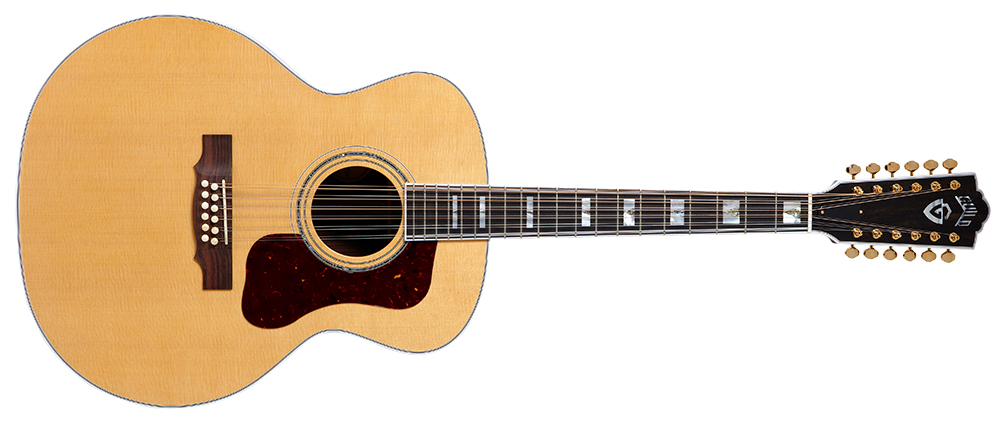
I personally consider the Guild jumbo 12-string acoustic guitar one of the greatest engineering feats of the 20th century, right up there with electricity, the vacuum tube, personal computer, interstate highway, space shuttle, jet airplane, television, etc. Sure, it may simply be a flattop acoustic guitar model developed rather late in the game during the ‘60s, but to many players the Guild jumbo 12-string is to the acoustic guitar what a Steinway Model D concert grand is to the piano.
Jimmy Page rather eloquently described his first encounter with a Guild jumbo 12 (a very rare early ‘70s F-612 model) in his book Jimmy Page – The Anthology: “I was in Manny’s guitar shop in New York when the guy working there said, ‘There’s a guitar here you’ll want to buy, a Guild 12-string.’ I told him that I already had a 12-string Harmony, but he insisted: ‘No, you’ll want to buy this.’
“He went to the other side of the shop, which was quite a considerable distance, played a few chords on it, and the sound projected right across the shop. There was no question about it. I should have it.”
Many guitarists have a similar reaction when they first play a Guild jumbo 12. Guild produced various jumbo 12 guitars over the years, including the F-212 and its larger XL variant, F-312, JF30-12, JF55-12 and JF65- 12. But it’s the 17-inch F-412 (arched maple back, maple neck and maple sides) and F-512 (rosewood back and sides, mahogany neck) models – along with the mammoth and virtually unobtainable 18-inch F-612 model – that are generally considered the go-to versions. Guild foreman Carlo Greco deserves credit for most of the jumbo 12’s design.

Over the years, Guild survived several changes of ownership along with numerous factory relocations, including Hoboken (New Jersey), Westerly (Rhode Island), Corona (California), Tacoma (Washington), New Hartford (Connecticut) and Oxnard (California). Cordoba purchased Guild in 2015, and with initial guidance from former Gibson acoustic master luthier Ren Ferguson, the company is producing USA and import versions that rival the classics.
Several ingenious attributes help make the Guild jumbo 12-string an impressive feat of engineering. The truly jumbo 17-inch wide, five-inch deep body delivers incredibly loud volume projection, and the top’s scalloped braces are meticulously refined and finely tuned to provide an ideal balance between strength, dynamic responsiveness and flexibility.
The neck has a rather long 25 5/8-inch scale length, but the wide and flat profile provides outstanding comfort and playability, and its dual truss rods (one of the first guitars to feature this design) keep the neck stable and straight even with the strings’ added tension.
This all results in bass that is big, booming and powerful without interfering with the sweet harmonics and cut of treble notes or the midrange punch and personality. The overall tone is huge and symphonic, which has made Guild jumbo 12s very popular with singer-songwriters like Simon and Garfunkel, John Denver, Tim Buckley, Dan Fogelberg and many others.
The 25 5/8-inch scale length can result in considerable string tension with a set of regular-gauge strings in standard. Tuning down a half or whole step or using light gauge strings is recommended for added comfort without sacrificing projection and tone.
Classic tunes featuring a Guild jumbo 12 include Led Zeppelin’s Over the Hills and Far Away, Supertramp’s Give a Little Bit, John Denver’s Rhymes and Reasons and Stevie Ray Vaughan’s Testify (and several other songs) from his MTV Unplugged performance.
More recently, Brian May switched to Guild F-412 and F-512 guitars when performing 39 live, and David Gilmour has adopted an F-512 to play Wish You Were Here to replace the Martin D12-28 he used in the studio.







